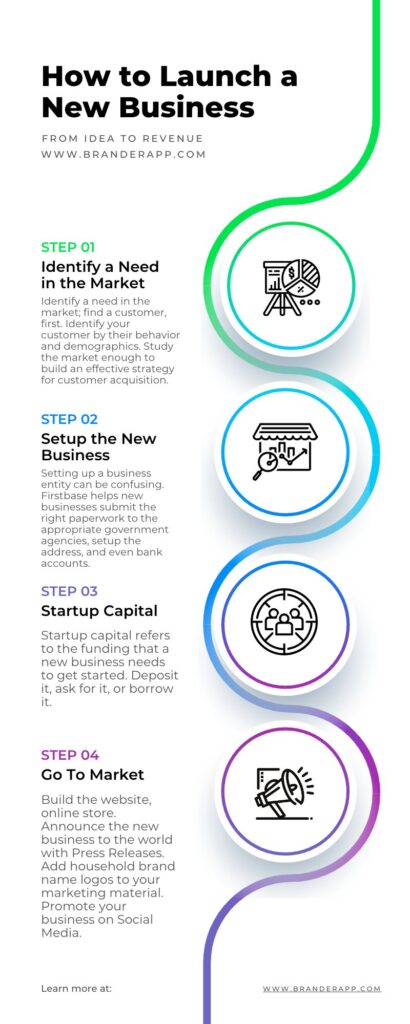
Starting a business can be overwhelming. There is a major difference  between kicking around ideas with friends/family and rolling up the sleeves and breaking ground on a new business. Businesses require planning, thought, learning, and execution. The lessons learned by trying different tactics contribute to what most refer to as “institutional knowledge.” Institutional knowledge will be one of your most valuable assets in the business. It will help you train new employees, reduce costs, increase efficiency, and generate profits. That is what you can look forward to after starting the business.
between kicking around ideas with friends/family and rolling up the sleeves and breaking ground on a new business. Businesses require planning, thought, learning, and execution. The lessons learned by trying different tactics contribute to what most refer to as “institutional knowledge.” Institutional knowledge will be one of your most valuable assets in the business. It will help you train new employees, reduce costs, increase efficiency, and generate profits. That is what you can look forward to after starting the business.
Read on to learn the most critical steps for planning and executing the launch of your new business.
Identify a Need in the Market
A common trap in business is to start work on a brilliant product or service only to learn the expensive lesson that there are no customers interested in the product or service. The business graveyard is littered with brilliant ideas. It takes a lot more than a brilliant idea to have a successful business. Successful businesses have customers willing to pay enough money for the goods or services to generate the business a respectable profit.
Flip the script and start with the market, also known as the customer.
Ideal Customer Profile
Another common misconception is entering a market with the expectation to sell to many types of customers. Casting a wide net and trying to be many things to many people is a very difficult path in business.
Start with a single customer. Sell to one person.
It may seem counterintuitive, but it helps to sharpen your focus on solving a problem for a single customer type. The message for this once customer will be so refined, so targeted, and so complete that when the right customer type hears it, the sale will be smooth and effortless.
Now, please do not take that to mean that spending a lot of time refining a sales strategy will make sales easy. Know that your product, message, and sales strategy will have to be tested and optimized based on feedback to help make sales smooth and effortless. There is a lot of work to be done between where you are today and smooth and effortless sales. Starting with the Ideal Customer Profile (ICP) is the first step in that journey.
Define your ICP based on demographics (age, location, gender, income, etc.). Based on your business, refine the ICP to include secondary information like the ICP’s interests (also known as psychographics). If you have access to potential customers, a good way to learn more about them is to survey them.
Surveying customers can be as simple or as complex as you make it. At this stage, a simple survey will be fine. If you can make a presale at this stage, then you know your business has strong demand. Be cautious when friends or family say they like your business idea yet do not commit to a presale. There is a strong chance that your friendship is more important to them than your business. Surveying unbiased potential customers is the best way to get unbiased and reliable input.
Market Research

Analyze relevant metrics that you believe are relevant to your business. For example, if you are planning on opening a local bakery, survey potential customers by asking how far they are likely to drive for baked goods, divide the local population by the number of bakeries, and identify a geographic location that has a relatively low bakery to population ratio.
Not all businesses will be as easy to research, especially new businesses with a Blue Ocean market (the simultaneous pursuit of differentiation and low cost to open up a new market space and create new demand).
Before investing too heavily in a business, do your due diligence on the market and customers. A high level of confidence in validating the idea will be helpful once you experience the challenges and hurdles of growing the business. A lack of due diligence can result in unnecessary fear, uncertainty, and doubt. Eliminate all unnecessary fear, uncertainty, and doubt with proper due diligence and data. The data will guide your plans.
Setup the New Business Entity
Setting up a business entity structure, whether it is a Sole Proprietorship, Partnerships, Limited Liability Corporation (LLC), Corporation, B Corporation (B Corp), can be confusing. Where does one start? Which paperwork is required? Which agency gets the paperwork? Paperwork varies based on state.
To make things easy, we have partnered with Firstbase. Firstbase helps new businesses submit the right paperwork to the appropriate government agencies. Firstbase also helps create an EIN (Employer Identification Number) for the business. The EIN will be used for communication with other businesses, banks, and government institutions.
The business entity must be created properly to be valid in the eyes of the government and insurers. If your business sells to other businesses, your business entity may go through due diligence. Being a viable business will require the proper structure to be recorded with the proper agencies.
Establish the New Business Address
When establishing the business address, think twice about using a home address. At the time of writing, working from home is quite common. However, do you really want your home address on the public record?
Alternatives include a virtual address using a service like EarthClass Mail, a Post Office Box nearby, or Firstbase.
Create a Bank Account
Business banks will help the business with securing lines of credit and/or term loans (a loan with a fixed payback period and interest rate). Establishing a good relationship with your business banker will help the business as it grows. Your business banker should be able to help secure lines of credit or loans to support the growth of the business.
Visit your local business bank or use Firstbase to help set up the business bank account.
A business bank account will be necessary to secure a business credit card.
Startup Capital
Startup capital refers to the funding that a new business needs to get started. This can include a variety of things, such as money to cover expenses while the business is being established, funds to purchase equipment and supplies, and money to hire employees. Startup capital can come from a variety of sources, including personal savings, loans from banks or other financial institutions, and investments from venture capitalists or angel investors. The amount of startup capital a business needs can vary significantly depending on the type of business and its size, as well as its projected revenue and expenses.
Self-Fund
There are several pros and cons to self-funding a startup:
Pros:
- Control: When you self-fund your startup, you maintain complete control over the direction and decisions of your business. This can be especially important for entrepreneurs who want to avoid having to answer to external investors or partners.
- Flexibility: Self-funding gives you the flexibility to make changes to your business as needed, without having to consult with or get approval from investors.
- Faster decision-making: Because you don’t have to go through the process of seeking funding from external sources, you can make decisions and move forward with your business more quickly.
Cons:
- Limited resources: Depending on the size and scope of your business, you may not have enough personal resources to fully fund your startup. This can limit the growth and potential of your business.
- Risk: Using your own personal funds to start a business can be risky, especially if the business doesn’t succeed. You could potentially lose a significant amount of money if the business doesn’t perform as expected.
- Opportunity cost: By using your own money to fund your startup, you may be missing out on other opportunities to invest those funds, such as in the stock market or real estate.
Overall, self-funding can be a good option for some startups, but it’s important to carefully consider the pros and cons before deciding.
Raise Capital from Investors
There are several pros and cons to raising capital from investors:
Pros:
- Access to funds: Raising capital from investors can provide a significant injection of funds for your business, allowing you to grow and expand more quickly.
- expertise: Investors often have a wealth of experience and expertise that they can share with the businesses they invest in. This can be valuable in terms of strategic planning and decision-making.
- Validation: Having external investors show interest in your business can be a strong validation of your business concept and can help to increase the credibility of your startup.
Cons:
- Loss of control: By accepting investment from outside parties, you may be giving up some control over the direction and decisions of your business. Investors may want to have a say in how their money is being used and may have certain expectations for the return on their investment.
- Dilution of ownership: Taking on outside investors can dilute your ownership stake in the business. This means that you may own a smaller percentage of the company after the investment is made.
- Time and effort: Raising capital from investors can be a time-consuming process, and it may require significant effort to prepare and present your business to potential investors.
Overall, raising capital from investors can be a good option for some businesses, but it’s important to carefully consider the pros and cons before deciding.
Branding
Branding refers to the process of creating a unique name, design, and image for a product or service in the minds of consumers. It involves the use of marketing tactics and techniques to differentiate a product or service from its competitors and to create a lasting impression in the minds of customers.
Effective branding helps to establish a company’s identity and can influence how customers perceive the company and its products. It can also help to create loyalty among customers and build a strong connection between the company and its target audience.
Branding can include a variety of elements, such as a company’s logo, slogan, packaging, and marketing materials. It also includes the overall look and feel of a company’s website, social media presence, and other online assets.
In addition to helping to differentiate a company from its competitors, effective branding can also help to increase the perceived value of a company’s products or services, which can lead to increased sales and revenue.
For help with branding, it can help to contact a professional branding service.
Logo
A logo is a graphic design, symbol, or emblem that represents a company or organization. It is typically used as a visual representation of the company’s brand and is often displayed on marketing materials, such as business cards, brochures, and websites.
Logos are important to companies because they help to establish the company’s identity and create a visual representation of its brand. A well-designed logo can make a strong impression on customers and help to differentiate a company from its competitors.
In addition to serving as a visual representation of a company’s brand, a logo can also help to build brand recognition and create a sense of familiarity among customers. This can be especially important for small businesses or startups that are trying to establish themselves in a crowded market.
Overall, a logo is an important element of a company’s branding strategy and can help to create a strong and lasting impression in the minds of customers.
Build a Website For A New Business
Building a website is important for businesses because it provides a platform for them to communicate with and reach their target audience. A website can serve as an online storefront, providing information about a company’s products or services, as well as a way for customers to make purchases or inquire about the business.
A website can also be a useful tool for establishing a company’s online presence and increasing its visibility. By creating a website, businesses can reach a larger audience and potentially attract new customers who may not have been aware of their products or services otherwise.
In addition to serving as a platform for reaching customers, a website can also be a valuable tool for building credibility and trust. A professional-looking website with detailed information about a company and its offerings can help to establish the business as a reputable and reliable source for products or services.
Overall, building a website is an important step for businesses of all sizes and can help to establish an online presence, reach a wider audience, and build credibility and trust with customers.
Website design and building technology has become extremely affordable and accessible in recent years. Services like Strikingly make business websites fast, appealing, and affordable.
Build and Online Store
An online store, also known as an e-commerce store, is a website that allows businesses to sell their products or services online. Online stores offer a convenient and easy way for customers to browse, select, and purchase products from the comfort of their own homes.
Online stores are important for new businesses because they provide a platform for reaching a wider audience and increasing sales. With an online store, businesses can sell their products or services to customers anywhere in the world, rather than being limited to a local or regional market. This can be especially valuable for small businesses or startups that are trying to establish themselves and grow.
In addition to increasing reach and sales, an online store can also help to save time and money for businesses. Setting up an online store can be more cost-effective than opening a physical storefront, and it can also reduce the time and effort required to manage and maintain a retail location.
Overall, an online store can be a valuable tool for new businesses looking to reach a wider audience and increase sales, while also saving time and money.
Announce the New Business Launch to the World
Now that your business website and/or online store is live and accessible to the world, you are ready to promote it by making the public aware of your presence. One way to announce the business to the world is by issuing a press release.
A press release is a written statement issued to the media that provides information about a new product, service, event, or development within a company. Press releases are typically written in a formal style and are designed to be informative and newsworthy.
Press releases can be an important tool for new businesses because they provide a way to communicate with the media and the public about the company’s activities and accomplishments. By issuing a press release, a business can attract the attention of journalists, bloggers, and other influencers who may be interested in writing about or promoting the company’s products or services.
Press releases can also be useful for building credibility and establishing a company as an industry leader or innovator. By issuing press releases about new products or services, or about the company’s involvement in important events or projects, a business can demonstrate its expertise and value to potential customers.
Overall, press releases can be a valuable tool for new businesses looking to generate buzz, build credibility, and reach a wider audience. Brander writes and publishes press releases for business affordably and effectively that will appear on major news affiliate websites, like ABC, CBS, NBC, Fox, Associated Press, USA Today, and more. Brander guarantees publishing on over 100 press releases with a money-back guarantee.
Marketing and Advertising For A New Business
Digital marketing refers to the use of various online and digital channels to promote products or services to customers. These channels can include social media, email, websites, search engines, and mobile apps.
Digital marketing is important for new businesses because it allows them to reach a wider audience and engage with potential customers in a cost-effective and measurable way. By using digital marketing tactics, businesses can target specific groups of consumers and track the effectiveness of their campaigns in real-time.
Digital marketing can also be an effective way for new businesses to build brand awareness and establish themselves in a crowded market. By creating a strong online presence and using tactics like content marketing and search engine optimization (SEO), businesses can increase their visibility and attract new customers.
Overall, digital marketing is an important tool for new businesses looking to reach a wider audience, build brand awareness, and drive sales.
As a new business owner, you can learn the digital marketing playbooks and tactics. If you have a budget for digital marketing, hiring a professional digital marketing team can allow you to focus on your core business.
Social Media For A New Business
Social media refers to online platforms that allow users to create and share content or participate in social networking. Examples of social media platforms include Facebook, Twitter, Instagram, and LinkedIn.
Social media is important for new businesses because it provides a way to reach and engage with potential customers online. By creating a social media presence and actively posting and interacting with followers, businesses can build brand awareness and establish themselves as thought leaders in their industry.
Social media can also be a useful tool for gathering customer feedback and insights, which can help businesses to improve their products or services and better meet the needs of their target audience.
In addition to its marketing and customer engagement benefits, social media can also be a useful tool for businesses to stay up to date on industry trends and news, and to connect with other professionals in their field.
Overall, social media is an important tool for new businesses looking to build brand awareness, reach a wider audience, and gather customer insights.
Sharing
Sharing information on social media can be important for businesses because it allows them to reach a wider audience and engage with potential customers in a more interactive and personal way. By sharing content on social media, businesses can attract the attention of followers and potentially reach new customers who may not have been aware of the business otherwise.
Sharing information on social media can also help businesses to establish themselves as thought leaders in their industry and build credibility with their target audience. By posting informative and interesting content, businesses can demonstrate their expertise and value to potential customers.
In addition to its marketing benefits, sharing information on social media can also be a useful way for businesses to stay up to date on industry trends and news, and to connect with other professionals in their field.
Overall, sharing information on social media can be a valuable tool for businesses looking to reach a wider audience, build credibility, and stay connected with their industry.
Engagement
Social media engagement refers to the interactions and interactions that occur between a business and its followers on social media platforms. These interactions can include likes, comments, shares, and other types of activity on a business’s social media posts.
Social media engagement is important for businesses because it helps to build relationships with customers and increase brand awareness. By actively engaging with followers on social media, businesses can create a sense of community and connection with their target audience, which can help to build loyalty and trust.
In addition to its relationship-building benefits, social media engagement can also be a useful tool for gathering customer feedback and insights. By actively listening to and responding to customer comments and questions on social media, businesses can learn more about their target audience and adjust their products or services accordingly.
Overall, social media engagement is an important aspect of a business’s social media strategy and can help to build relationships with customers, increase brand awareness, and gather valuable insights.
Accounting
A good accountant can be extremely valuable to a new business. Accountants are trained professionals who can provide a wide range of services that can help businesses to manage their finances and make informed decisions about their financial strategies.
Some of the ways in which a good accountant can be valuable to a new business include:
- Financial planning: Accountants can help businesses to create financial plans that align with their goals and objectives. This can include creating budgets, forecasting revenue and expenses, and identifying areas for cost savings.
- Tax compliance: Accountants can help businesses to understand and comply with tax laws and regulations, which can help to avoid costly mistakes and penalties.
- Bookkeeping and financial reporting: Accountants can help businesses to keep accurate and organized financial records, and can provide regular financial reports that help businesses to understand their financial performance and make informed decisions.
- Financial analysis: Accountants can provide valuable insights and analysis that can help businesses to make informed decisions about their financial strategies.
Overall, a good accountant can be an invaluable resource for a new business, providing a wide range of services that can help businesses to manage their finances, comply with tax laws, and make informed decisions about their financial strategies.
If you need help getting started with an accountant, Firstbase can help.

One Response